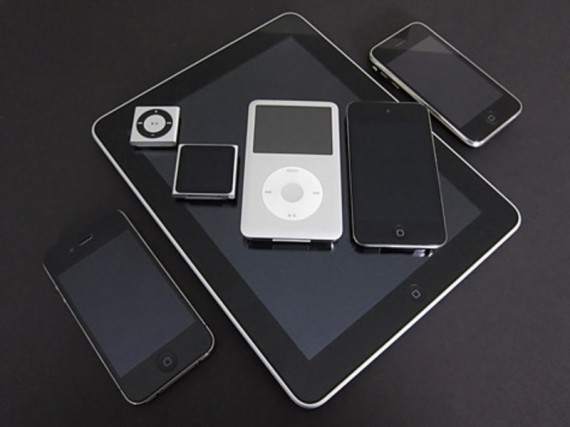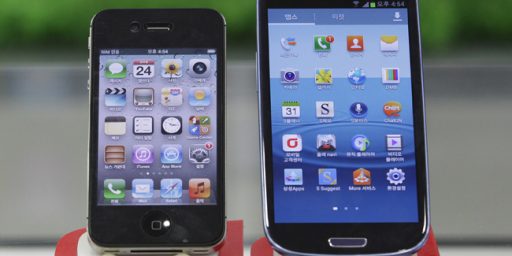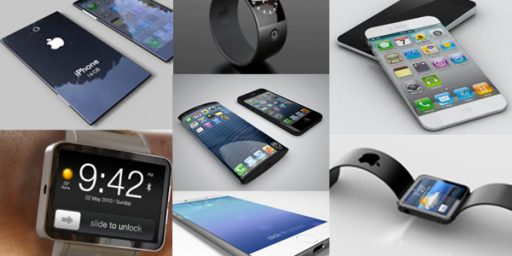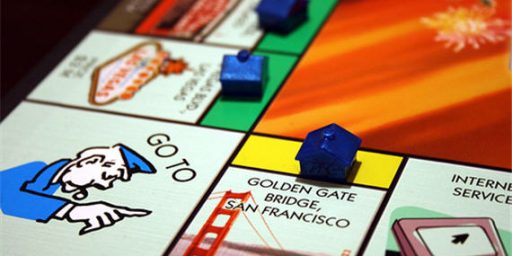Google Seeks To Bar Apple From Importing iPhones, iPads, & iPods Into The U.S.
A new lawsuit from Google's Motorola Mobility subsidiary seeks to bar Apple from importing it's most popular products into the United States.
Google’s Motorola Mobility subsidiary has filed a new lawsuit against Apple alleging that they have infringed on several of Motorla patents, and seeking as a remedy an order that would bar Apple from shipping it’s most popular products into the United States:
Google Inc’s Motorola Mobility unit said it filed a new patent-infringement case againstApple Inc. claiming that features on some Apple devices, including the Siri voice-recognition program, infringe its patents.
The complaint at the U.S. International Trade Commission claims infringement of seven Motorola Mobility patents on features including location reminders, e-mail notification and phone/video players, Motorola Mobility said yesterday. The case seeks a ban on U.S. imports of devices including the iPhone, iPad and Mac computers. Apple’s products are made in Asia.
“We would like to settle these patent matters, but Apple’s unwillingness to work out a license leaves us little choice but to defend ourselves and our engineers’ innovations,” Motorola Mobility said in an e-mailed statement.
Motorola Mobility and Apple have been fighting since at least 2010 after licensing talks failed. Apple has said Motorola Mobility is making unreasonable demands, and argues that phones made by Motorola Mobility and other handset manufacturers that run on Google’s Android operating system are copying key patented features of the iPhone.
The complaint is the second that Libertyville, Illinois- based Motorola Mobility has filed at the agency against Apple. A copy of the new complaint wasn’t immediately available. The commission is scheduled to announce a final decision Aug. 24 in the earlier case, and could impose an import ban on the iPhone.
Without seeing a copy of the Complaint, it’s hard to say if the allegations that Google/Motorola is making here rise to a level that would be considered sufficient to justify an import ban, or if the case would even get past the motion to dismiss case. As the article mentions, there is another complaint pending against Apple with the ITC asking for the same relief in which a decision is due by the end of next week. However, at least one commentator doesn’t think that the first complaint will lead to a full import ban:
The ruling for that case is expected to come down next week. This was a standard-essential patent, though, making an import ban based on the upcoming ruling in this previous case unlikely. Mueller also notes that if Motorola won a ban in this case, this wouldn’t affect the iPhone 4S and new iPad 4G, as these use a Qualcomm chipset that falls outside of Motorola’s patent claims.
As I said, until we see the complaint in the new suit, it’s hard to judge how strong a case Motorola Mobility has here, but it’s worth noting that this is just the latest round in an ongoing series of lawsuits among smartphone manufacturers alleging patent infringement. In addition to the Motorola claims against Apple, Apple has also asserted claims against Motorola alleging that the Android operating system infringes on key elements of the iPhone. As we speak, Apple and Samsung are involved in a trial that began July 31st that is the cap on a years-long dispute over allegations by Apple that Samsung copied key features of the iPhone in making its smartphones, while Samsung is making similar allegations against Apple. At this point, the trial has gone on so long, and the disputes have gotten so petty, that the presiding judge recently asked counsel for each side if they were “smoking crack.” Of course, that’s a question that could be asked about the entire American Patent law system at this point in time.
On some level, I have to think that the odds of a Judge actually issuing an order barring Apple from importing the most popular consumer electronics products out there seems to be slim to me. Indeed, depending on the nature of Motorola’s claims, such an order may not even have an impact on the upcoming iPhone 5, which is reportedly being based on an entirely new chipset. More importantly, one has to wonder whether it’s really proper to grant patents for things like the ability to swipe across the bottom of a phone to unlock it or answer a call. And in a rational universe, these disputes would be easily resolved via licensing agreements. The world we live in now, though, if far from rational and many companies earn as much revenue enforcing patents, some of which they’ve never even taken advantage of, than they do from actually making products. I’m pretty sure that’s now what the Founders intended when they granted Congress the power to issue patents.







The real problem that needs to be addressed is that the patent system has completely broken down for software. They keep rewarding ridiculously overbroad patents to companies, which has ended up fueling a lot of the lawsuits like this in recent years.
There was for about 15 years starting in the mid 90s a string of rather silly “..on the Internet” patents, where someone would take something that would be plainly non patentable on a normal computer and get a patent for doing it over the internet, because the patent examiners for some reason couldn’t grok that doing something on a remote computer instead of your local one really didn’t change the nature of the process in 95% of cases. Now we’re stuck in a stream of similarly silly “…on a cellphone” patents.
Following up on what Stormy wrote and leaving aside whether software or business process patents should be granted at all, a major problem in granting software or business process patents is that the Patent Office does not have the ability to determine whether they’re granting a patent on the software or business process equivalent of the wheelbarrow. Or the wheel, for that matter.
Software and business processes are tremendously diverse. Many software companies are just one person and there are hundreds of thousands or even millions of them. In such an environment how do you determine whether something is obvious or prior art?
A number of years ago I was doing a patent search and stumbled across a whole group of IBM patents which I knew as a matter of firsthand knowledge were, in fact, not only prior art but had been prior art for a decade prior to the patent being granted.
People have been saying for years that the Patent system is completed FUBAR’d when it comes to the way it’s applied to technology. In large part, that’s because Patent examiners are applying standards developed for the industrial age to a completely different era an ending up with results that end up stifling innovation.
It’s fundamentally absurd, for example, to give a patent for a finger swipe on a touch screen. Even if it’s not prior art, it’s not exactly an innovation either.
@Dave Schuler:
But they should not 😉
Interesting saga here: How to patent an algorithm in the US
@Doug Mataconis:
I have many friends in the technology world – in management, in investor relations, and patent law – and they all basically agree with what you just said.
The patent-copywright laws need to be overhauled because the current system will definitely end up to stiflling innovation.
Come on these guys should just unleash the awesome power of the “free” market and tell the government to get out the patent grating business completely.
@Rick DeMent:
That’s true. In a free market there would be no patents. But people who believe in free markets tend to also think that their ideas are tangibly theirs and that the government should insure that no one else can have the same idea (if they arguably had it first, regardless if it was developed independently).
Yes, but note that it was Apple that began this game by *explicitly* using the patent system to try to break it´s competitor. That was Saint Steve Jobs wanted to do.
The extent to which corporate America itself is an impediment to the market is an undertold story.
@Trumwill:
That is a fact, industry is the reason for government intrusion on industry.
@André Kenji de Sousa:
As with most things Apple is claimed to have invented, patent trolling was around before Apple started doing it. They just brought it to the attention of the broader public.
I’m a more-or-less lifelong Windows user, stuck with Windows Mobile until earlier this year, and am varying degrees of anti-Apple, but… I’m pretty sure that even in the realm of smartphones, Microsoft got the ball rolling on this.
On the other hand, Microsoft just took their money and let it go. Apple is taking a more hard-line strategy and actually trying to prevent people from doing stuff.
@Trumwill:
Symbian, and then in rapid sequence Windows, Palm, and Blackberry.
@john personna: So Nokia started it? I was sure it was a product of American ingenuity. I feel the slightest bit let down by our corporate cutthroats.
+1 to all of the comments on this thread. In particular, @Dave Schuler’s statement that:
As a “co-inventor” on one such patent (owned by a large corporation currently attempting to sell it’s portfolio) I can attest to how often this sort of thing happens in the software and technology industries.
@Doug Mataconis:
Exactly. Both Patents and Copyrights — while originally very necessary creations — have developed into monsters that are creating far more problems and stifling creativity in ways that are fundamentally detrimental to society. While neither should be eliminated, they need to be completely reworked.
Unfortunately, part of the reason that this will not happen is that there is little to no incentive for reworking a system designed to protect those who were lucky enough to “make it big.”
@Trumwill:
It was a really interesting time. Cell phones used to be for contractors and mobile businesses only. I remember when they were taken as affectation for normal folk. Techies used PDAs in those days, and Apple’s Newton was certainly an early player in that.
Everybody knew “convergence” as going to happen and it was a matter of time. A number of people tried combinations until the iPhone hit it “correctly.” I quote “correctly” because Apple had an important advantage, a fan base who would pay more for a phone than anyone would from any other provider. So Apple could make a more expensive phone, further ahead of the curve.
Apple is lawsuit happy now because smart phones have become just too cheap, and anybody can make them. Cheap phones must be … delayed.
@john personna: I first jumped on board the PDA express in 2006, with a couple used HP iPaq’s running WinMo PPC 2003. I went on to work for a smartphone division of a big corporation where for security reasons they banned PDA’s but not smartphones (for some reason they figured that a PDA with cellular capability and a camera wasn’t the threat that a PDA with a dictation recorder was?) and it was on to WinMo for phones.
It was *just* early enough that I could look at the iPhone and see all of the things that it can’t do that my PDAs and smartphones could (nevermind that the opposite was often true). I stuck with WinMo as long as I possibly could before making the switch to Android.
But yeah, your read on how the iPhone came to dominate the consumer smartphone market (well, until Android got caught up). Somebody needed to say “Hey you! YOU! You want a smartphone!” and Apple was uniquely situated to do so. And, of course, they offered a smartphone that consumers could more easily use.
Speaking of FUBAR (to the max) — we’ve not even touched on gene patenting and lawsuits…
Even more problematic is that every country has its own intellectual property laws. A friend of mine works as a lawyer in the industry and, apparently, Hong Kong and a handful of other places have very strong criminal laws for violation of some absurd patent claims. So, it’s not just our laws that are stupid and fixing our laws won’t even solve much of the problem in a global market.
A really neat and somewhat related story:
Skilled Work, Without the Worker
It’s a new kind of capitalism, with intellectual property, with robots, without workers.
@James Joyner:
Actually, we are the market. Related:
@Trumwill:
More or less. At the time the Ipod was a very popular MP3 player and many people were choosing to listen to music using their cell phones. Putting a Ipod and a cell phone together was a natural idea.
The big difference to me is that Nokia and the Asians were trying to compete solely based on price while Apple brought products that everyone would want, regardless of price.
@sam:
I think a distinction needs to be made in terms of gene patents. If they’re creating some new genome which doesn’t occur naturably, then I think that’s patentable (e.g. corn that’s been given a gene to produce pesticides). The problem is when they’re allowed to patent the identification of the function of a naturally occuring gene.
@Stormy Dragon:
Yeah, as I understand it plant patents (in Luther Burbank’s day) were narrowly define to the lineage of the plant created. Similarly an insulin producing microbe should be protected as a lineage, and should not block parallel development paths.